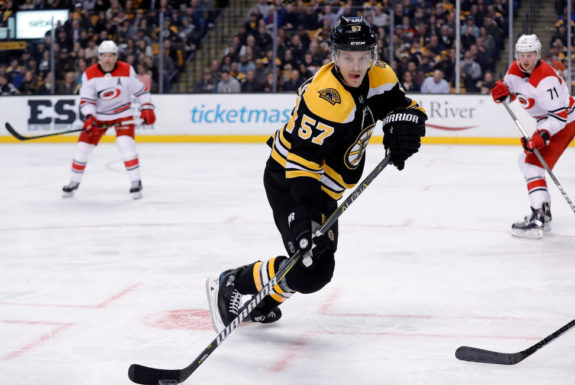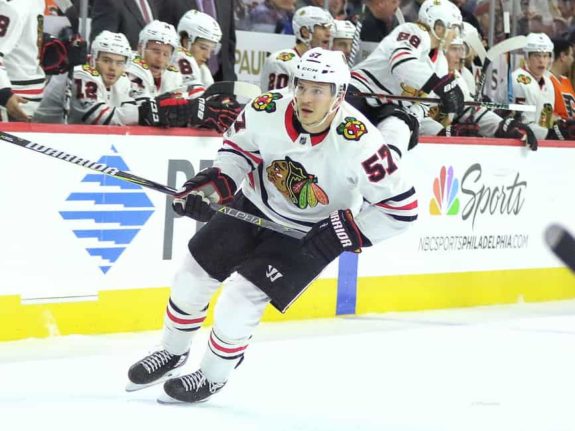There are many trades that the Chicago Blackhawks have made. Some have made big noise around the league just by the magnitude of it. For every Artemi Panarin and Niklas Hjalmarsson-esque trade, there are some that are more covert. They go out the ear as fast as they come in but can be just as significant. In my opinion, a trade that falls into that category is center Tommy Wingels. I believe it had more cons than pros for the Blackhawks, which makes it more notable.
Wingels Prior to the Trade
Wingels was a well-known veteran prior to him joining the Hawks, spending seven years with the San Jose Sharks. In 337 games played, he had 51 goals, 77 assists, and 122 points; with his faceoff percentage (FO%) at 40.7. He was one of the tools that made the Sharks a consistent force in the Western Conference.
Related: Blackhawks’ Best Trades of All-Time
He was then dealt to the Ottawa Senators at the trade deadline in 2017. He spent half of a season with them where he had four points in 36 games, and a FO% of 46. Becoming a free agent after his Senators stint, he signed with the Blackhawks on July 1, 2017, on a one year deal. As an Evanston, IL native, he instantly became a fan favorite. Although his skills on the ice kept that label afloat.
Playing Style
Wingels’ game reflects more of a hidden gem short. He isn’t the most ostentatious player, but he’s effective. He is a player that is able to secure the third and fourth lines. It’s a position that has to be that way to have team success. He is a two-way player that you can provide some offense as well as having a good physical, defensive punch. (from ‘Evanston-born Tommy Wingels returns to Chicago as Blackhawks forward,’ The Daily Northwestern, 11/01/2017).
Related: Top 5 Captains in Blackhawks History
Wingels’ play speaks louder than his stats because, with the Blackhawks, he had 12 points in 57 games with a FO% of 49. However, by looking at the footage, you can see that he is someone who is precise. He does the little things. He can score, hit, block, and win faceoffs. In his career, Wingels has 310 blocked shots and 1,211 hits.
Blackhawks Tenure
Unfortunately, Wingels came during the year that the Blackhawks were on the fast track to missing the playoffs for the first time in almost a decade. When a season turns as ugly as the Hawks’ did, nothing is off the table as it applies to trades. They went on to become sellers at the deadline and traded Wingels to the Boston Bruins for a conditional fifth-round pick. Although he was far from being Chicago’s problem, they wanted to stock up on assets, and he was one of their attractive trade pieces.
The Bruins wanted him as a player that would secure their Stanley Cup run. With the Bruins, he had five points in 18 games, with a FO% of 50. I think the hope was that the Blackhawks would re-sign him in free agency, but that didn’t end up happening. In fact, he didn’t get another NHL deal at all. Wingels has been playing in Switzerland with Genève-Servette HC of the National League since 2018, which is baffling.
Implications of the Trade
I think trading Wingels is more significant now than it was back then. Trading him was an understandable move considering the state of the club at the time. However, the team has had a hard time replacing his role since. The Blackhawks’ third and fourth lines are a mess and there has been a revolving door of players being brought in to help fill the void. For the most part, it has failed. Most of that failure comes with how management has used trades as a solution.

They traded right-wing Vinnie Hinostroza in 2018 as part of a trade package to the Arizona Coyotes to re-acquire center Marcus Kruger. While Kruger had success in the past with the organization, his return was anything but that. They traded right-wing Ryan Hartman to the Nashville Predators in 2017 in part for center/left-wing prospect Victor Ejdsell, who I don’t believe will ever make it to the team. They traded away Artem Anisimov to the Ottawa Senators for center Zach Smith last offseason. Smith’s cap hit over $3 million. Smith’s production is similar to Wingels but is more expensive. Chicago most likely could have gotten Wingels back on a cheaper deal to help their salary cap issues.

I feel as if the Blackhawks shot themselves in the foot after losing Wingels. In doing so, they traded pieces that they need to help establish the bottom lines. The organization’s forward depth is currently bleak. To top it off, they also ended up adding more to the salary cap in that process. The team used the conditional fifth-round pick from the Bruins, which ended up becoming a fourth-round pick, to draft center Antti Saarela.
Related: Longest Stanley Cup Droughts
He is currently 18 years old, so it’s hard to tell if he will grow into becoming anything for the Blackhawks. All in all, I don’t think that trade was worth it because of its disarray. What will be key going forward is how the franchise will handle their other centerpieces like Dylan Strome, Kirby Dach, David Kampf; and prospects like Evan Barratt and Jake Wise. If they can all live up to expectations, then this trade shall go back to its status of being a non-issue.